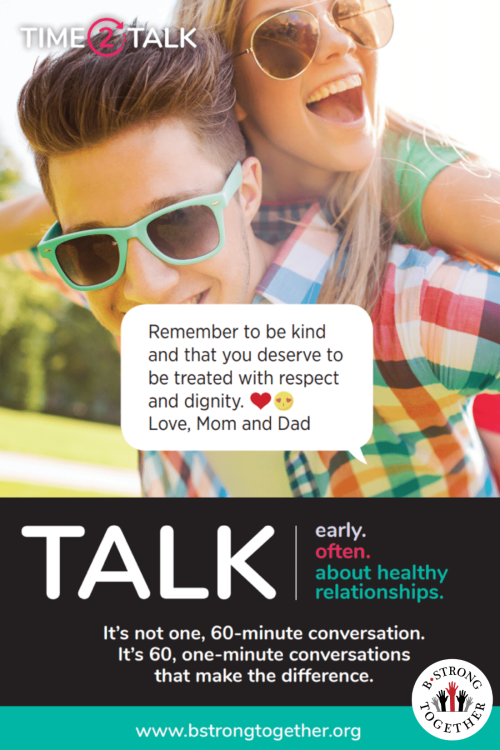Time-2-Talk
About Healthy Relationships

* REMEMBER *
When talking with your children and teens about important topics, it’s essential to remember that it isn’t just one 60-minute conversation. It’s 60 one-minute conversations, sharing your family values and teaching these lifelong lessons, that make the difference.
Healthy relationships and strong connections with others don’t just make us feel good, they are also good for our health. Studies have shown that healthy, fulfilling relationships with others lead to less stress, fewer health problems, a greater sense of well-being and purpose, and a longer life.
These positive relationships can be found between any two people who love, encourage, help, and support each other. They are based on open, honest, and safe communication coupled with mutual respect, compromise, empathy, and connection.
In order to develop these critical connections, we must teach our children and teens about healthy relationships. Here are some tips:
- Define and model healthy relationships. Clearly communicate your values about kindness, compassion, trust, respect, diversity, and inclusion. Talk about what it means to be a good friend, family member, or partner.
- Teach your children the language of emotions. Help them learn to identify and name their feelings.
- Support their voice. Encourage them to express what they are thinking and feeling and the use of “I” statements. As they are sharing, model careful listening and validate their feelings so that they know that their thoughts and emotions are ok. Teach and model for them healthy communication skills and strategies.
- Develop a close connection with your child or teen through time together, positive interactions, acceptance, respect, and emotional responsiveness. Not only does this model a healthy relationship in their own life, but it also boosts self-esteem and increases the likelihood that they will come to you with problems or concerns.
- Teach and model self-respect, empathy, and compromise.
- Set clear rules and expectations about name-calling, teasing, bullying, and physical violence.
- Talk about healthy boundaries. This includes discussions about consent beginning at a young age.
- Teach them that they can always come to you for advice or support.
As teens are learning to navigate relationships with dating, school peers, at home, with friends, and within the community, encourage them to speak up, respect others, compromise, be supportive, create healthy boundaries, and respect other’s privacy. If you see warning signs of an abusive relationship such as excessive texting, depression or anxiety, or major changes in behavior or dress, take them seriously, be supportive, and seek help.
If you are concerned about a relationship and are looking for support, visit the Healthy Barrington website for local resources.
Whether it’s a relationship with a family member, a friend, a co-worker, or a partner, learning how to establish and talk about healthy relationships is vital. Talking about relationships shouldn’t just come in times of conflict. Thinking about and reflecting upon your relationships can help you to grow. To help, Stanford University has created a wonderful resource – the “Let’s Talk! A Relationship Check In” guide.
